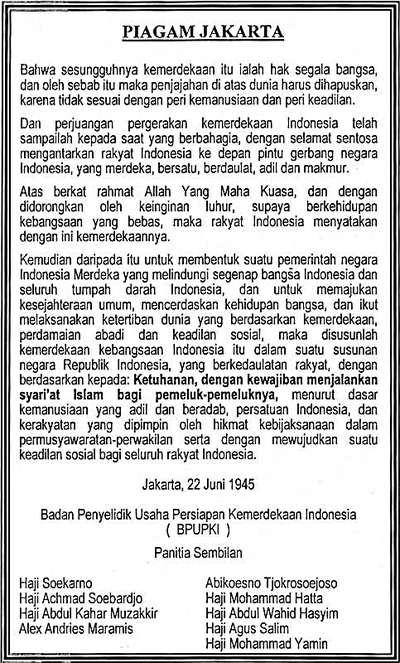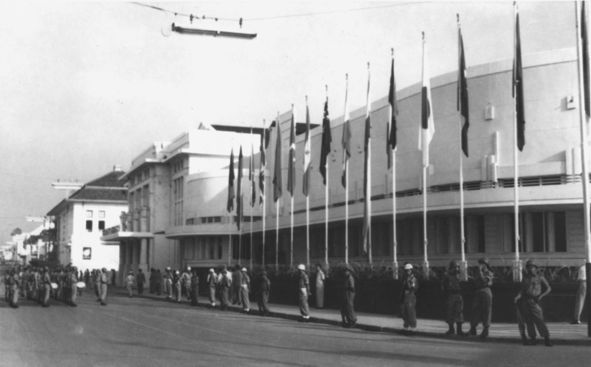|
I Gusti Ketut Pudja
I Gusti Ketut Pudja (19 May 1908 – 4 May 1977) was an Indonesian politician and national hero, who served as the first governor of Lesser Sunda from 1945 until 1946. He was a member of the Investigating Agency for Preparatory Work for Indonesian Independence (BPUPK). He was also present at Admiral Tadashi Maeda's house, during the preparation for the Proclamation of Indonesian Independence on 17 August 1945. Making him the only Balinese to be present during the proclamation. Pudja was born on 19 May 1908 in Singaraja, Bali. He graduated from Rechtshoogeschool in Batavia (now Jakarta), and he started working in the Bali and Lombok Residency Office in Singaraja, in 1935. A year later, he was placed in the ''Raad van Kerta'', a court in Bali at that time. Pudja was a member of the Preparatory Committee for Indonesian Independence (PPKI), formed on 7 August 1945, to continue the work begun by the Investigating Committee for Preparatory Work for Independence (BPUPK). Following the ... [...More Info...] [...Related Items...] OR: [Wikipedia] [Google] [Baidu] |
Susanto Tirtoprodjo
Susanto Tirtoprodjo (3 March 1900 – 16 November 1969) was the acting Prime Minister of the Republic of Indonesia (part of the United States of Indonesia from 20 December 1949 to 16 January 1950. He was also a member of the Investigating Committee for Preparatory Work for Independence The Investigating Committee for Preparatory Work for Independence ( id, Badan Penyelidik Usaha-usaha Persiapan Kemerdekaan, BPUPK; ja, 独立準備調査会, Hepburn: , Nihon-shiki / Kunrei-shiki: ), sometimes referred to as the Investigating Co ... (BPUPK) and served in a number of early Indonesian cabinets. References 1900 births 1969 deaths Politicians from Central Java Indonesian Muslims Interior ministers of Indonesia BPUPK People from Surakarta {{Indonesia-politician-stub ... [...More Info...] [...Related Items...] OR: [Wikipedia] [Google] [Baidu] |
Preparatory Committee For Indonesian Independence
The Preparatory Committee for Indonesian Independence ( id, Panitia Persiapan Kemerdekaan Indonesia), PPKI, ja, 独立準備委員会, Dokuritsu Junbi Iinkai, lead=yes) was a body established on 7 August 1945 to prepare for the transfer of authority from the occupying Japanese to Indonesia. It approved and promulgated the first Indonesian constitution, and appointed Sukarno president. Background In two sessions from May to July 1945, the Investigating Committee for Preparatory Work for Independence (BPUPK) decided on Pancasila as the ideological basis of independent Indonesia, and produced a draft constitution. With the war turning against them, the Japanese, who were occupying Indonesia, decided to grant independence in order to create problems for the returning Dutch colonial authorities. The plan was that Java would become independent in early September, followed shortly by the rest of the country. On 7 August, the day after an atomic bomb was dropped on Hiroshima, Lt. Ge ... [...More Info...] [...Related Items...] OR: [Wikipedia] [Google] [Baidu] |
Badung Regency
Badung is a regency of Bali, Indonesia. Its regency seat is in the upland town of Mangupura. It covers districts to the west of the provincial capital of Denpasar, and it has a land area of 418.52 km2. The regency had a population of 548,191 at the 2020 Census. It has undergone a population boom in recent decades (although not between 2010 and 2020), and has grown into the largest of the suburban regions of Greater Denpasar. It covers Bali's most heavily populated tourist regions, including Kuta, Legian, Seminyak, Jimbaran, Nusa Dua, Canggu, Uluwatu, Badung, and Mengwi. The northern part of the regency is relatively unpopulated, but the part near the coast and west of Denpasar from Jimbaran and up to Canggu is heavily populated. Ngurah Rai International Airport is located within the Regency. Administrative districts The Regency is divided into six districts (''kecamatan''), listed below from south to north with their areas and their populations at the 2010 Census and ... [...More Info...] [...Related Items...] OR: [Wikipedia] [Google] [Baidu] |
Japanese Occupation Of The Dutch East Indies
The Empire of Japan occupied the Dutch East Indies (now Indonesia) during World War II from March 1942 until after the end of the war in September 1945. It was one of the most crucial and important periods in modern Indonesian history. In May 1940, Germany occupied the Netherlands, and martial law was declared in the Dutch East Indies. Following the failure of negotiations between the Dutch authorities and the Japanese, Japanese assets in the archipelago were frozen. The Dutch declared war on Japan following the 7 December 1941 Attack on Pearl Harbor. The Japanese invasion of the Dutch East Indies began on 10 January 1942, and the Imperial Japanese Army overran the entire colony in less than three months. The Dutch surrendered on 8 March. Initially, most Indonesians welcomed the Japanese as liberators from their Dutch colonial masters. The sentiment changed, however, as between 4 and 10 million Indonesians were recruited as forced labourers ('' romusha'') on economic deve ... [...More Info...] [...Related Items...] OR: [Wikipedia] [Google] [Baidu] |
Master Of Laws
A Master of Laws (M.L. or LL.M.; Latin: ' or ') is an advanced postgraduate academic degree, pursued by those either holding an undergraduate academic law degree, a professional law degree, or an undergraduate degree in a related subject. In most jurisdictions, the "Master of Laws" is the advanced professional degree for those usually already admitted into legal practice. Background on legal education in common law countries To become a lawyer and practice law in most states and countries, a person must first obtain a law degree. While in most common law countries a Bachelor of Laws (LL.B.) is required, the U.S. generally require a professional doctorate, or Juris Doctor, to practice law. The Juris Doctor (J.D.) is a professional doctorate Under "Data notes" this article mentions that the J.D. is a professional doctorate.. Under "other references" differences between academic and professional doctorates, and contains a statement that the J.D. is a professional doctorate Report ... [...More Info...] [...Related Items...] OR: [Wikipedia] [Google] [Baidu] |
Bandung
Bandung ( su, ᮘᮔ᮪ᮓᮥᮀ, Bandung, ; ) is the capital city of the Indonesian province of West Java. It has a population of 2,452,943 within its city limits according to the official estimates as at mid 2021, making it the fourth most populous city in Indonesia. Greater Bandung (Bandung Basin Metropolitan Area/BBMA) is the country's third-largest metropolitan area, with nearly nine million inhabitants. Located above sea level, the highest point in the North area with an altitude of 1,050 meters and the lowest in the South is 675 meters above sea level, approximately southeast of Jakarta, Bandung has cooler year-round temperatures than most other Indonesian cities. The city lies on a river basin surrounded by volcanic mountains that provides a natural defence system, which was the primary reason for the Dutch East Indies government's plan to move the capital from Batavia (modern-day Jakarta) to Bandung. The Dutch first established tea plantations around the mou ... [...More Info...] [...Related Items...] OR: [Wikipedia] [Google] [Baidu] |
Algemene Middelbare School
Algemene Middelbare School or AMS (Dutch, "General Secondary School") was during part of the twentieth century a level of education in the Netherlands (and the Dutch East Indies), comparable with the high school level in the US education system. Its successors were the mavo and vbo, now both replaced by vmbo. See also * Education in the Netherlands Education in the Netherlands is characterized by division: education is oriented toward the needs and background of the pupil. Education is divided over schools for different age groups, some of which are divided in streams for different education ... References Education in Indonesia Schools in the Dutch East Indies {{Indonesia-stub ... [...More Info...] [...Related Items...] OR: [Wikipedia] [Google] [Baidu] |
Malang
Malang (; ) is a landlocked List of regencies and cities of Indonesia, city in the Indonesian Provinces of Indonesia, province of East Java. It has a history dating back to the age of Singhasari, Singhasari Kingdom. It is the second most populous city in the province, with a population of 820,043 at the 2010 Census and 843,810 at the 2020 Census.Badan Pusat Statistik, Jakarta, 2021. Its surrounding (the Greater Malang, metropolitan area) is home to 3,663,691 inhabitants in 2010, spread across two cities and 22 districts (21 in Malang Regency and one in Pasuruan Regency). Malang is the List of Indonesian cities by GDP, third largest city by economy in East Java, after Surabaya and Kediri (city), Kediri, with an estimated 2016 GDP at Indonesian rupiah, Rp. 44.30 trillion. The city is well known for its mild climate. During Dutch colonization, it was a popular destination for European residents. Even now, Malang still holds its position as a popular destination for international t ... [...More Info...] [...Related Items...] OR: [Wikipedia] [Google] [Baidu] |
Meer Uitgebreid Lager Onderwijs
Meer Uitgebreid Lager Onderwijs (Dutch, "more advanced primary education") was during part of the twentieth century a level of education in the Netherlands (and the Dutch East Indies), comparable with the junior high school level in the US education system. Its successors were the mavo and vbo, now both replaced by vmbo. This level of education was used up to 2021 in Suriname, when it was replaced with "voortgezet onderwijs". In Suriname, MULO was a four year program. It was split into MULO-A which was focused on business and MULO-B which was focused on science. After graduating, students could move onto three-year VWO leading to university or a two-year HAVO leading to higher vocational training. See also * Education in the Netherlands Education in the Netherlands is characterized by division: education is oriented toward the needs and background of the pupil. Education is divided over schools for different age groups, some of which are divided in streams for different educatio ... [...More Info...] [...Related Items...] OR: [Wikipedia] [Google] [Baidu] |
Hollandsch-Inlandsche School
Hollandsch-Inlandsche School (HIS) (Dutch school for natives) was a school during the Dutch colonial era in Indonesia. The school, was first established in 1914, following with the enactment of the Dutch Ethical Policy. The school was at the Low Education level (''Lager Onderwijs'') or at the level of basic education today. The school was intended for the population of indigenous Indonesian descent. Generally reserved for children from the noble class, prominent figures, or civil servants. The length of the school is seven years. See also * Hogere Burger School (HBS) * Hollandsch Chineesche School (HCS) * Hollandsch Inlandsche Kweekschool Hollandsch Inlandsche Kweekschool (Dutch for ''Dutch native development school''), often abbreviated as HIK, were a type of Christian Dutch language auxiliary teacher training schools for Indonesian students in the Dutch East Indies in the early t ... (HIK) * Hollandsch Javaansche School (HJS) * Meer Uitgebreid Lager Onderwijs (MULO) R ... [...More Info...] [...Related Items...] OR: [Wikipedia] [Google] [Baidu] |






